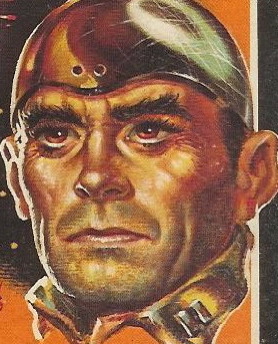There's something so simple, elemental, and badass about this design. I found myself thinking "Why don't more books like this?" Slightly frantic font set off against the slightly frantic geometrical linear configuration. Hot and cool at the same time. Minimal but substantial. Colorful, but with a B&W feel. Love! I also love the back cover, where we get to learn a thing or two about our author:
The other book I pulled out of that shop is less surprising, but no less intriguing:
How am I supposed to resist this? The genius of Penguin design, the beat-upness of a good book well read, the Chandler of Chandler of Chandler. I didn't even ask 'how much?' (answer: more than it was worth, less than I would've gladly paid). If I had to design a book to read on a train, it would look like this. I think it would *be* this. HOWEVER, I completely forgot that, for reasons I now forget, Philip Marlowe was not called Philip Marlowe in the UK editions of Chandler's work (despite the fact that the playwright Marlowe was British, and the fact that Marlowe evolved out of the earlier Mallory—another important British writer (minus one "l")). Instead, the detective is called Johnny Dalmas. You would not think a simple name change would affect my reading pleasure. You would be dead wrong. I just couldn't get past it. Marlowe is so far from a "Johnny" that I found it hard to take the stories seriously. It's like if Yakkity Sax started playing over the climactic scene in "The Godfather." To my ears, all kinds of tonally wrong. Anyway, the book still looks cool, which is mostly what matters.
More from The Collection very soon—I'm gonna step up production to make up for the lengthy hiatus.
Later,
RP


6 comments:
I have a set of Chandler books published by the Folio Society of London. They retained the Philip Marlowe name but "corrected" a bunch of other stuff. The only one I remember off the top of my head is where Marlowe used the "lift" to go up to the first floor, but there were others. Pretty jarring!
When I read British authors I don't want them "translated" into American, either. Can you imagine Murder on the Poughkeepsie Express?
Gordon Slatter died just a month ago at the age of 90. The Oxford Companion to New Zealand Literature offers a good description of A Gun in His Hand:
His first book, the novel A Gun in My Hand (1959), went through five impressions within a year in New Zealand and UK. It is a psychological thriller, the stream-of-consciousness one-day odyssey of a disillusioned man revisiting his Christchurch past, vainly bent on resolving the guilt he carries from traumatic war experiences. This present-day action, which builds a Joycean picture of Christchurch and includes pub scenes unmatched in raw realism until Alan Duff, is intercut with extraordinarily vivid fragments of memory from the New Zealand Division's Italian campaign of 1945 and from work experience on the wharves, on farms, in the freezing works, and elsewhere. The overall effect is an intensely painful imaginative rendering of the life and consciousness of the generation of New Zealand males that endured World War 2 and its long aftermath.
The book Trouble Is My Business is a collection of Chandler's early shorts from his Black Mask days... pre-Marlowe. John Dalmas was one of his early detectives, and there were others. The names were changed to Marlowe in some later printings, and many of these early stories were 'cannibalized' (Chandler's word) to produce the Marlowe novels.
From the introduction to the collection Killer in the Rain:
"When Chandler published “Killer in the Rain,” his fourth story, in 1935, he was still experimenting with his principal character, a nameless first person narrator. In the next of these three stories the detective operated under the name of Carmady, and in the following three he was John Dalmas. By 1941 in “No Crime in the Mountains” he appeared as John Evans, but in the meantime he had become the Philip Marlowe of Chandler’s novels."
If he's got "A Gun In My Hand", he really ought to specify which hand. If it's his left, ok it's a gun. If it's his right hand, it's a "gun".
Thanks for the clarification, McClaverty. After reading Romney and the American press's attacks of the British preparations for the Olympics, I thought this would be a (justified) continuation of embarrassments this week.
Still, he was never referred to as "Jimmy" Bond on the right side of the Pond, was he?
Hi,
I'm the editor for the Books section on Before It's News, and I came across your website Pop Sensation.
We'd love to republish your RSS feed on our site, with a description of your blog and link back to your website. You'd benefit from having some of our millions of readers see your posts and go through to your blog.
Let me know if this sounds like something you're interested in!
Best regards,
Sebastian Clouth
SClouth@beforeitsnews.com
Post a Comment